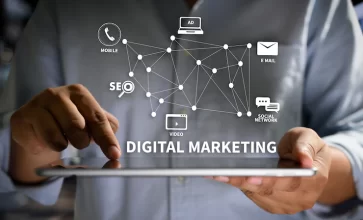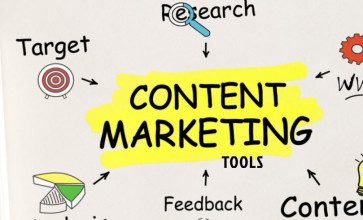8 Digital Marketing Tips to Transform Your Business
Whether you?re launching a startup or running an enterprise, effective marketing is critical to success. Giving you the power to position your brand, promote your USPs and engage with your target audience, your marketing strategy can really make or break your business.
While offline marketing certainly remains relevant, it is digital marketing that has really taken the lead in recent years. As technology continues to evolve, there?s no doubt that digital marketing will continue to be the most effective way for businesses to market their products and services.
For entrepreneurs, managers, and business owners, this means that getting to grips with online marketing isn?t just beneficial; it?s essential. From gaining brand awareness and increasing sales to commandeering the market and optimizing customer lifetime values, you?ll rely on marketing campaigns to help you achieve every one of your commercial goals.
To get started, take a look at these eight digital marketing tips to transform your business now:
1. Identify Different Types of Digital Marketing:

Digital marketing is an ever-increasing industry, which means there are numerous tools and techniques you need to be aware of. Before you can get to this stage, however, you?ll need to familiarize yourself with the various different types of online marketing your business will be using.
Search engine optimization (SEO), PPC campaigns, social media marketing, email marketing, influencer marketing, and affiliate marketing are just a selection of the most common types of digital marketing used by brands today.
If you are looking at selecting a digital marketing agency, then you need to first make sure that they have the experience and expertise of helping you out. To explore agencies with proven track records in SEO and other digital marketing strategies, check out Digitech Web Design.
However, each one has its own unique attributes, sub-sections, and methodologies, so there?s a lot to learn! Despite this, you?ll need to know how to leverage these different types of digital marketing to maximize your success and which tools and strategies to use to achieve your goals.
2. Understand the Importance of Content:

Content marketing is often described as a type of digital marketing and it can certainly be viewed in this way. However, content also plays a critical role in every marketing campaign you execute.
When you?re publishing posts on social media, for example, every tweet, image, or piece of text is ?content?. Similarly, if you want to launch a PPC campaign, you?ll need to create content for each ad and, when you?re boosting your SEO rankings, you?ll be relying on your website content to push your webpages higher on search engine results pages (SERPs).
As a result, content marketing is one of the most important elements of your overall digital marketing strategy. With so much resting on the quality of your content, it?s vital to prioritize this aspect of your marketing. Creating content calendars, finding out what type of content performs best on each platform, and publishing content that really speaks to your target audience are just some of the things you?ll need to do to market your brand successfully.
3. Use Powerful Analytics:

Digital marketing gives you the option to access valuable data relating to your audience and your campaigns, providing you use analytics appropriately. Before you even begin creating marketing strategies, you can use predictive analysis to determine what?s going to be most relevant and how your audience will react, for example.
In addition to this, you can capture and collate data in real-time when campaigns are in progress to monitor their success and tweak their performance. Doing so will enhance your results and enable you to maximize the return on your investment, so don?t risk missing out on what analytics can offer.
As this can be a complex area, it can be extremely helpful to study it in detail. When you complete an online digital marketing analytics certification with Emerson College, for example, you?ll have the opportunity to learn more about descriptive analytics, customer segmentation, predictive analytics, web analytics, social media, and voice of the customer (VOC) analytics and much, much more.
Combining theoretical knowledge and practical skills, pursuing an advanced qualification in marketing data analytics can give you the springboard you need to optimize your marketing performance and transform your business as a whole.
4. Stay on Top of the Latest Trends:
Digital marketing continually evolves in conjunction with emerging technology and changing user behavior. Due to this, it?s vital to stay on top of the latest trends and incorporate them into your own marketing campaigns. In 2021, for example, top digital marketing trends include:
- Virtual events
- Artificial intelligence (AI)
- Augmented and virtual reality (AR and VR)
- Social media purchasing
- Voice-activated searches
As well as using the latest trends to inform your campaign designs, it?s important to recognize the type and style of content that your own target audience is interested in and that they are most receptive to. Statistics show that users who visit a website via a click-through video are 184% more likely to make a purchase and likely to spend 45% more, for example, which highlights how lucrative video marketing can be for B2C businesses.
5. Deliver Omnichannel Experiences:
Today?s customer journeys can vary significantly from one user to another. With so many touchpoints available, customers can interact with brands in numerous ways, which can mean that they have totally different experiences. One user might click through to your site via a social media post and make a purchase straight away, while another might make a phone inquiry after seeing a guest post on an external blog. Still, the majority of today’s millennials prefer SMS marketing. Connecting with them via business text messaging is a great option since text messages have guaranteed open rates of 98%.
Although your target audience will engage with you in numerous different ways, they should receive the same great customer service, regardless of which methods they choose to use. When you deliver omnichannel digital experiences, you elevate your brand across all touchpoints and make sure that your target audience always has a positive interaction.
While many brands deliver multichannel customer service, few businesses offer genuine omnichannel experiences. By doing so, you can outperform your competitors, increase customer acquisition rates and send your profits soaring.
6. Prioritize Mobile Performance:

Mobile internet usage has risen substantially in recent years and now accounts for more than 55% of all web traffic. As more people access online content via a tablet or cellphone, it?s essential that your website and content is primed to deliver optimal mobile performance.
Since the introduction of mobile-first indexing by Google, the performance of your site on mobile devices plays a critical role in your SEO rankings. However, it also has a major impact on user experience (UX) and satisfaction. As well as creating content with mobile usage in mind, it?s vital to ensure that your webpages load quickly, are accessible, and are displayed correctly on mobile devices.
No matter what types of digital marketing you use in your campaigns, they will only be effective if users can engage with them on their preferred device. Responsive web design (RWD) is, perhaps, one of the easiest ways to ensure your online content is accessible across the myriad of devices that are out there, but prioritizing mobile performance is a savvy way to optimize the success of your website and your online marketing strategy.
7. Provide Personalized Customer Journeys:
Users are routinely exposed to generic content and have become adept at ignoring what isn?t relevant to them, which is why non-specific content will only have a limited effect. In contrast, personalized content can increase engagement, optimize conversion rates, increase sales and boost brand loyalty.
If you want to improve your marketing performance and generate a higher ROI, personalization can help you to achieve your goals. A personalized customer journey can involve a variety of tactics, but common examples of personalization include:
- Custom product recommendations
- Segmented email marketing
- Bespoke navigation options
- Gamification
- Geo-specific targeting
- Unique search results
Although delivering personalized content might seem tricky at first, there are a variety of tools out there that can help you to implement personalized solutions. In fact, you?ll be surprised at just how easy it is to facilitate personalized customer journeys and reap the rewards that follow.
8. Take a Strategic Approach:

Marketing should never be left to chance or be an afterthought. When you incorporate marketing strategizing into every aspect of your business, you can ensure that you?re always developing with your target audience in mind.
When you begin brainstorming ideas for a new product or service, for example, take the opportunity to begin planning potential marketing concepts too. By using data obtained from previous campaigns and predictive analytics, you can devise effective strategies that will increase the success of future launches and sales from the get-go.
When you take a strategic approach and embed marketing into the heart of your business, you can change the way your brand connects with its audience and optimize your subsequent financial performance.
Growing Your Business with Digital Marketing:
If you want to expand your business, increase its share of the market, and generate higher profits, effective marketing is essential. Fortunately, digital marketing gives you access to low-cost tools, a receptive audience, and copious amounts of valuable data. When you use these elements cohesively, you can create innovative and engaging marketing campaigns that excite and inform your audience while taking your brand and your business to the next level.
Read Also:






















